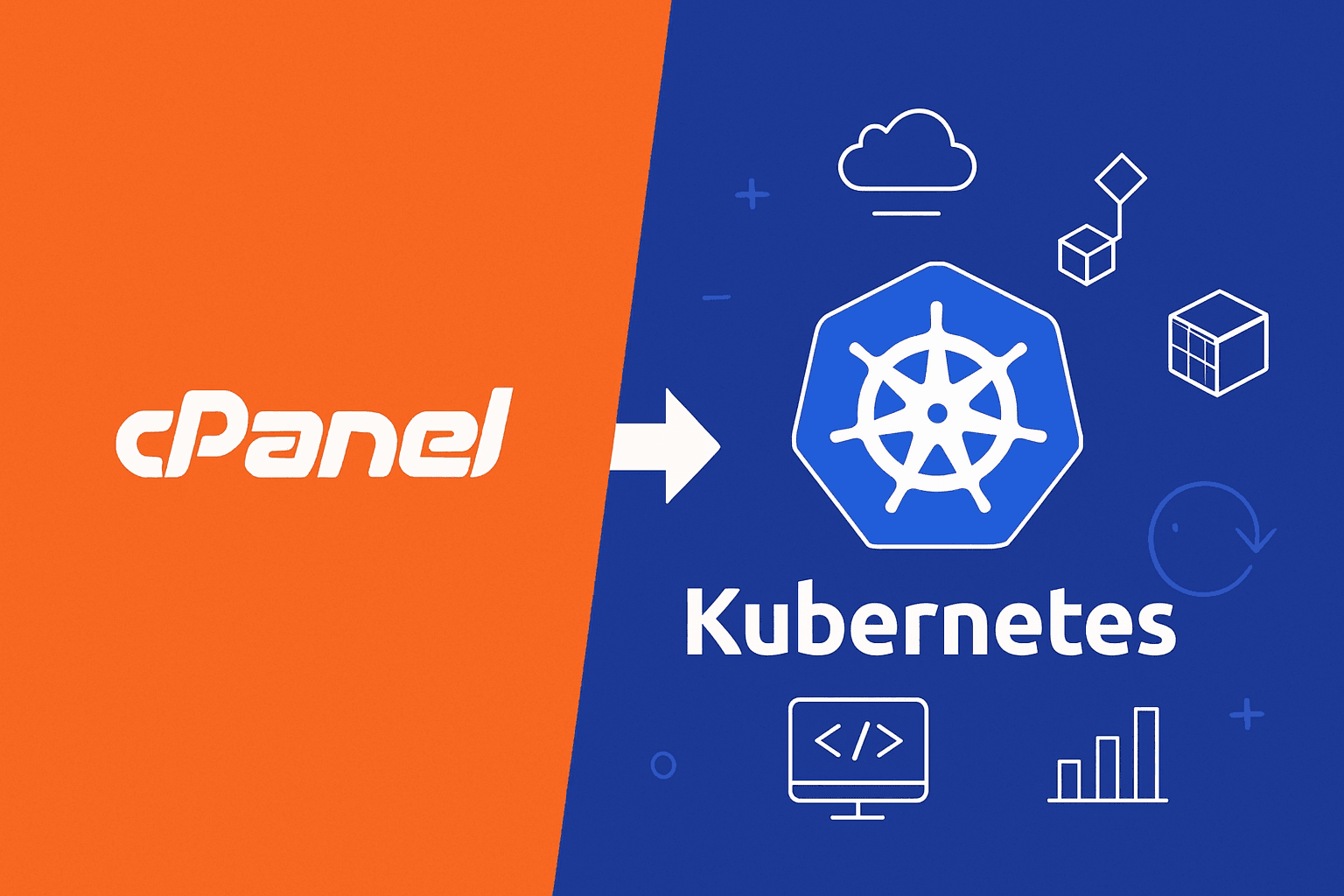
Moving from cPanel to Kubernetes Solution
Migrating from traditional cPanel-based hosting environments to Kubernetes-based infrastructure has become a notable trend in recent years. Users running workloads like WordPress sites, SaaS applications, and other web services are increasingly considering this shift to gain a competitive edge. Common motivations include better scalability, cost efficiency, and modern operational standards. Kubernetes is seen as the future of infrastructure management enabling automation, strong security isolation, and virtually limitless scaling.
This article explores the key reasons behind the migration from cPanel to Kubernetes, focusing on DevOps practices, security, and scalability, and highlights both the benefits and the challenges.
Evolving DevOps Practices and Automation
One of the strongest drivers of Kubernetes adoption is its transformation of DevOps workflows. Unlike cPanel, where server configurations and deployments are often manual or GUI-based, Kubernetes embraces automation and Infrastructure as Code.
Consistent Environments: Kubernetes configurations are defined in code (YAML/Helm), enabling consistent environments across dev, test, and production.
CI/CD Pipelines: Kubernetes integrates seamlessly with CI/CD tools for automated, zero-downtime deployments.
Immutable Infrastructure: Containers are ephemeral; Kubernetes auto-replaces failed instances, improving reliability.
Standardized Deployments: Developers use APIs and manifest files instead of manual tickets or GUI panels.
Self-Service Deployments: Empower developers to launch or update services without infrastructure bottlenecks.
In contrast, cPanel lacks modern automation capabilities and suits teams reliant on manual admin practices. Kubernetes aligns better with agile DevOps methodologies.
Enhanced Security, Isolation, and Policy Enforcement
Security is a critical concern as applications scale. Kubernetes introduces several improvements over cPanel-based environments:
Key Security Features:
Container Isolation: Each workload runs in a sandboxed container, unlike cPanel where shared OS environments pose risks.
RBAC and Namespaces: Role-Based Access Control ensures least privilege access. Namespaces isolate tenants or services within the same cluster.
Network Policies: Define which pods can communicate, enabling micro-segmentation.
Pod Security Standards: Enforce least privilege, run-as-non-root, and other hardening techniques.
Secrets Management: Kubernetes Secrets encrypt credentials, API keys, and certificates. These stay outside the application codebase.
Automated Updates & Monitoring: Rolling updates, image scanning, runtime alerts, and integrations with Prometheus/Falco enhance visibility and defense.
Overall, Kubernetes enforces a defense-in-depth model that’s harder to replicate on cPanel.
Scalability and Resilience at Any Scale
Kubernetes was built to support modern web scale. For applications like WordPress and SaaS platforms, Kubernetes provides:
Horizontal Auto-Scaling: Add/remove pods based on traffic or resource usage.
High Availability: Automatically recover from pod or node failures with zero intervention.
Efficient Resource Use: Better bin-packing and resource quotas help reduce waste and lower costs.
Multi-Region Deployment: Easily spin up clusters in new regions with the same codebase.
Mixed Workload Management: Run frontend, backend, databases, and background jobs in one orchestrated environment.
WordPress on cPanel may hit performance ceilings quickly. On Kubernetes, it can be scaled across pods and zones for global reach and performance.
Summary of Key Benefits
| Benefit | Kubernetes | cPanel |
|---|---|---|
| DevOps Automation | CI/CD, IaC, GitOps ready | Manual scripts or GUI |
| Security | RBAC, secrets, isolation, policies | Shared OS, weaker controls |
| Scalability | Auto-scale, self-healing, HA | Manual scaling, limited HA |
| Resource Efficiency | Dynamic allocation, better bin-pack | Static resource use |
| Portability & Flexibility | Cloud/on-prem ready, vendor-neutral | Single-hosted, less portable |
Consider Open Source Distributions Like OKD
For teams looking to adopt Kubernetes without vendor lock-in, open source distributions like OKD (Origin Kubernetes Distribution) provide a compelling solution. OKD is the community-supported version of Red Hat OpenShift and includes a web console, built-in CI/CD tools, and secure container orchestration on top of standard Kubernetes.
OKD is particularly valuable for:
Development and staging environments before moving to commercial OpenShift
Teams that want a fully open-source, production-ready Kubernetes platform
Businesses seeking easier administration through OKD’s user-friendly UI and built-in automation
By deploying OKD, organizations can take advantage of Kubernetes benefits while also gaining a pre-integrated DevOps experience out of the box.
Moving from cPanel to Kubernetes represents a shift toward modern infrastructure management. For growing businesses, SaaS providers, and high-traffic websites, Kubernetes delivers superior scalability, automation, and security. However, it also introduces complexity that must be carefully managed.
When aligned with the right team structure and project scale, Kubernetes offers a future-proof platform that enables innovation, operational agility, and robust service delivery.
For organizations ready to evolve beyond traditional hosting limitations, Kubernetes is more than just an upgrade – it’s a transformation.
Take a look at this article for OKD Kubernetes Solution
